|
|
|
Sort Order |
|
|
|
Items / Page
|
|
|
|
|
|
|
| Srl | Item |
| 1 |
ID:
084938
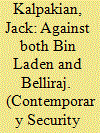

|
|
|
|
|
| Publication |
2008.
|
| Summary/Abstract |
The question about the relationship between al-Qaeda and terrorist organizations operating at the national, regional and international levels has been at the centre of the debate concerning appropriate policy responses to both. Debates focus on the question whether to treat terrorism mostly as a home-gown, grassroots phenomenon, or something significantly inflamed by foreign encouragement and sponsorship. Evidence from Morocco suggests that the national and regional terrorist organizations exhibit varying degrees of affiliation with al-Qaeda, ranging from acting as local franchises to complete independence.
The Moroccan state's response to this flexible situation is evaluated in the three case studies, each reflecting the case of terrorist organization or cell that has been dismantled. They show that Moroccan anti-terrorism policy has been generally successful, despite some erosion in human rights. The framework used in the study examines the sequence of events that led to the dismantling of the organization studied, the demographics of its membership, its ideology, and its targets. The holistic response, which combines heightened levels of law enforcement, socio-economic reform, and religious restructuring, is helping Morocco with its war against both domestic and international terrorism and may offer hints for counterterrorism elsewhere.
|
|
|
|
|
|
|
|
|
|
|
|
|
|
|
|
| 2 |
ID:
054958
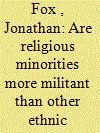

|
|
|
| 3 |
ID:
159881
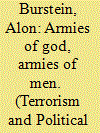

|
|
|
|
|
| Summary/Abstract |
This article compares the violent activity of secular and religious terror organizations. Utilizing data compiled by the Global Terrorism Database cross-referenced with secondary and primary sources regarding the degree of religious components embedded in organizations’ ideologies, it tests the violent patterns of activity carried out by organizations guided by predominantly secular, secular/religious, and religious ideologies, between the years 1970 and 2012. The findings confirm that a) religious ideology correlates with specific, more deadly, attack tactics and violent patterns; and b) the degree of religious components within terror organizational ideology should be tested along a spectrum: the more religious an organization is, the more attacks it tends to carry out, and the deadlier its attacks become.
|
|
|
|
|
|
|
|
|
|
|
|
|
|
|
|
| 4 |
ID:
022899
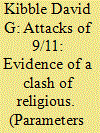

|
|
|
|
|
| Publication |
Autumn 2002.
|
| Description |
34-45
|
|
|
|
|
|
|
|
|
|
|
|
|
|
|
|
| 5 |
ID:
092469
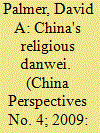

|
|
|
| 6 |
ID:
052032
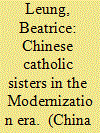

|
|
|
|
|
| Publication |
March 2004.
|
| Summary/Abstract |
This article aims to explore the contributions of Chinese Catholic sisters in the Deng-Jiang era by examining their way of life and the problems they face within and outside the church structure. In the course of this discussion, we look at the history of Chinese Catholic sisters and the harassment they experienced in Maoist China. In discussing the sisters' way of life, we discover that they face important problems: difficulties with recruitment stemming from the sociopolitical situation in China, and inadequate training, both religiously and professionally, which hamper the sisters' development. We therefore conclude that leadership and institutional norm-building within the sister congregations are matters calling for immediate attention.
|
|
|
|
|
|
|
|
|
|
|
|
|
|
|
|
| 7 |
ID:
084224
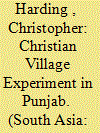

|
|
|
| 8 |
ID:
086861
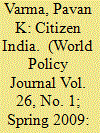

|
|
|
|
|
| Publication |
2009.
|
| Summary/Abstract |
Winston Churchill once said that India is merely a geographical expression-no more a single country than the equator. His colonial assumption was that the Indian nation was a creation of the British, and that prior to it there was only collection of competing diversities-linguistic, ethnic, religious, regional, and political.
|
|
|
|
|
|
|
|
|
|
|
|
|
|
|
|
| 9 |
ID:
154496


|
|
|
|
|
| Summary/Abstract |
This article discusses the depiction of the exodus myth in advertisements in Israeli secular and religious daily newspapers from 1948 to 2008. Its premise is that advertising as a persuasive communication tool adapts itself to its target audience. As a result, there are notable differences in the use of the myth in advertisements targeting various audiences. A total of 1907 advertisements were examined with the use of quantitative content analysis. The research premise was extensively substantiated and can point to the differential perception of the exodus myth among Israel’s secular and religious populations.
|
|
|
|
|
|
|
|
|
|
|
|
|
|
|
|
| 10 |
ID:
145300
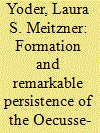

|
|
|
|
|
| Summary/Abstract |
The Oecusse-Ambeno enclave of Timor has persisted as a geographically distinct zone under Portuguese governance for over three centuries, enduring repeated efforts to undo its enclave status. This article analyses the confluence of economic, religious, and political elements that brought and kept Oecusse within Portuguese rule on Timor. Strong local authorities controlled trade linkages, maintained political and military ties with colonial rule, and wove Catholicism into existing customary practices and hierarchies, forging a strong regional identity that fostered sustained alliance with the Portuguese. Finally, the article discusses the impacts of Oecusse's enclave status over the past century.
|
|
|
|
|
|
|
|
|
|
|
|
|
|
|
|
| 11 |
ID:
144919
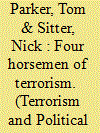

|
|
|
|
|
| Summary/Abstract |
David Rapoport's concept of Four Waves of terrorism, from Anarchist terrorism in the 1880s, through Nationalist and Marxist waves in the early and mid-twentieth century, to the present Religious Wave, is one of the most influential concepts in terrorism studies. However, this article argues that thinking about different types of terrorism as strains rather than waves better reflects both the empirical reality and the idea that terrorists learn from and emulate each other. Whereas the notion of waves suggests distinct iterations of terrorist violence driven by successive broad historical trends, the concept of strains and contagion emphasizes how terrorist groups draw on both contemporary and historical lessons in the development of their tactics, strategies, and goals. The authors identify four distinct strains in total—Socialist, Nationalist, Religious, and Exclusionist—and contend that it is possible to trace each strain back to a “patient zero” active in the 1850s.
|
|
|
|
|
|
|
|
|
|
|
|
|
|
|
|
| 12 |
ID:
093708
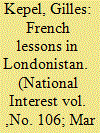

|
|
|
|
|
| Publication |
2010.
|
| Summary/Abstract |
MUSLIMS HAVE been landing on the shores of Britain and France for decades. And, as these populations arrived and settled in the Republic, Paris pursued a policy it believed would eventually lead immigrants to full cultural integration into French society. Meanwhile, London, facing a similar influx of foreigners, attempted to create a full-fledged multicultural polity. The former emphasized that what was shared between the new arrivals and their native hosts was crucial, their differences secondary. The latter argued that the British needed to respect the uniqueness of their immigrant neighbors-whether national, religious or ethnic-and that such a stance was at the core of a harmonious political system. In color-blind France, built on a long tradition of a strong, centralized state and the successful assimilation of southern and eastern Europeans-who have been migrating to the country since the nineteenth century-religious identity was not to interfere in public life. Under the French tricolor, state and nation were fused into the cradle of the one and indivisible Republic. In race-aware Britain, with Anglicanism as its established church, there was always room for different nationalities-English, Welsh, Scottish, Irish-under the Union Jack.
|
|
|
|
|
|
|
|
|
|
|
|
|
|
|
|
| 13 |
ID:
121599
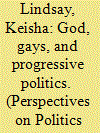

|
|
|
|
|
| Publication |
2013.
|
| Summary/Abstract |
I draw on conservative black Christians' claims regarding their co-constitutive racial, religious, class, and sexual subordination to demonstrate that intersectionality is a heuristic that can be used to advance a range of normative arguments. My research rejects traditional understandings of intersectionality as a necessarily progressive analytical framework, as well as recent discussions that suggest that intersectionality's use for conservative ends is evidence of its theoretical underdevelopment. My analysis also reveals that by positing interlocking racism, classism, heterophobia, and anti-Christian bigotry as blacks' "true" experience of oppression, conservative black Christians guide political scientists to consider 1) that intersectional analysis is central rather than antithetical to in-group policing; 2) that we can best interrogate the standards that social groups use to police their boundaries when we adopt a normative-critical conception of power, and 3) that power so defined challenges the erroneous assumption that our role is to either describe or prescribe social reality.
|
|
|
|
|
|
|
|
|
|
|
|
|
|
|
|
| 14 |
ID:
102604
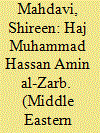

|
|
|
|
|
| Publication |
2011.
|
| Summary/Abstract |
This article will explore and analyze the life and times of Haj Muhammad Hassan Amin al-Zarb (1834-1898) who was a self-made man who went on to become Iran's first major entrepreneur and the richest man in Iran. He started life in poverty and obscurity and ended his days in wealth and prominence. His rise to social and economic importance was so meteoric that it became the stuff of legends blending the myth and the reality of his life. He was a visionary with progressive ideas beyond his time. His world view was formed partly by his experiences in childhood and early life but beyond that by his own perspicacity. His cosmos was governed by his devotion to and responsibility for his family both nuclear and extended, by his deep religious belief, by patriotism and by the ambition to succeed in business. The article will investigate all of the above.
|
|
|
|
|
|
|
|
|
|
|
|
|
|
|
|
| 15 |
ID:
106536
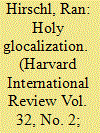

|
|
|
| 16 |
ID:
124973
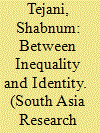

|
|
|
|
|
| Publication |
2013.
|
| Summary/Abstract |
Recent attention to the history of constitution-making in India reflects ongoing concerns about the difficulties and limitations of India's secular, democratic experiment. Scholars assessing India's secularism have pointed to the failure to separate the state from its involvement in religion from the outset. Through a study of the Constituent Assembly debates, this article suggests that the emphasis on 'religion' as the problem for secularism has been a distraction, taking the gaze away from the substantive arguments minorities were making about how their equal citizenship should be guaranteed. It remained unclear what recognition of 'minority' status was meant to achieve in postcolonial India and what it signified. In failing to recognise the claims of religious minorities for their equality, the Constituent Assembly reified their position as permanently unequal communities in the newly independent state.
|
|
|
|
|
|
|
|
|
|
|
|
|
|
|
|
| 17 |
ID:
167683
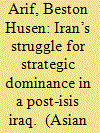

|
|
|
|
|
| Summary/Abstract |
Iran's influence and presence in Iraq have increased significantly in recent years. The collapse of the Saddam's dictatorship in 2003, after the US invasion, served to inflate Iran's influence in Iraq, particularly in the post-ISIS era. In this connection, Iran has used various means and tools to develop its strategy in Iraq. This article argues that Iran's current strategy in Iraq stems from a Realpolitik agenda rather than an ideological one, concerned more with political, economic, and security interests than pursuing revolutionary objectives per se. To this end, Tehran has largely relied on long-established relationships with several pro-Iranian political parties and militia groups. These relationships are often couched in religious ideological terms as a foundation and justification for its future strategy in post-ISIS Iraq. The questions that this paper will address are the following: what was Iran's role in defeating ISIS in Iraq? How has Tehran benefitted from its long-term relationships with Iraqi political parties and militia groups? What are the Iranian sources of power in Iraq and how do they help Iran gain strategic dominance in Iraq?
|
|
|
|
|
|
|
|
|
|
|
|
|
|
|
|
| 18 |
ID:
056879
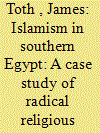

|
|
|
| 19 |
ID:
060192
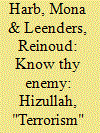

|
|
|
| 20 |
ID:
127031
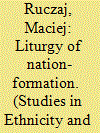

|
|
|
|
|
| Publication |
2013.
|
| Summary/Abstract |
The Dublin 1916 Easter Rising is most often analysed in terms of the 'blood sacrifice' concept and its 'theatrical' aspect with both rhetorical devices being ascribed to Patrick (Padraic) Pearse - poet, dramatist, and a crucial figure in the development of the discourse of Irish nationalism. This article proposes a reading of Pearse's literary and political texts centred on the relation between the religious and the political. Starting with the delineation of the complex 'translation of the sacred' from the religious to the secular context, the article then examines the two above-mentioned key dimensions of the Rising, its sacrificial and 'theatrical' aspects, demonstrating their theological affinities. The two are interconnected through the thomistic theory of the liturgical sign, suggesting that the Easter Rising, as a crucial event in the construction of Irish nationhood, was devised and carried out per analogiam to the liturgical symbolism of the Catholic Mass.
|
|
|
|
|
|
|
|
|
|
|
|
|
|
|
|
|
|
|
|
|